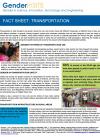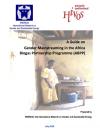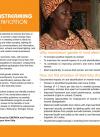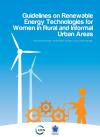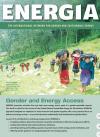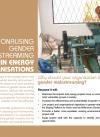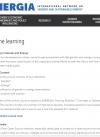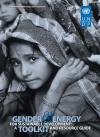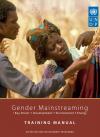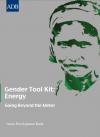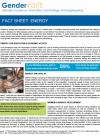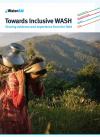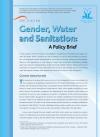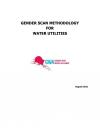Resources
23 Sep 2016
GenderInSITE, 2015: Fact sheet provides at-a-glance overview of gender issues in transportation.
TYPE: Fact sheets
22 Sep 2016
ENERGIA/Hivos, 2010: Guide provides guidance on how to integrate gender concerns within biogas programmes, including what gender interventions can be undertaken as part of programme activities, what institutional aspects need to be looked at, and
how to monitor progress made on gender aspects, drawing specifically on experience with the Africa Biomass Partnership Programme (ABPP).
REGIONS: Sub-Saharan Africa
22 Sep 2016
ENERGIA: Technical brief provides guidance on possible gender issues and entry points in rural electrification projects as well as actions that can help ensure equitable access to the benefits of rural electrification for women and men. It is based on ENERGIA’s experiences with assisting rural electrification agencies in Botswana, Senegal, Kenya and Uganda.
REGIONS: Sub-Saharan Africa
22 Sep 2016
IUCN/ENERGIA: Compilation of materials intended as a tool to help women understand different energy technology concepts, the variety of technologies available to them, and how choice of technology can be affected by social or gender relations, among others. They offer information to
assist women to make informed decisions about technology.
22 Sep 2016
ENERGIA: Fact sheet outlines the main issues in gender mainstreaming in sustainable energy, and provides key recommendations and examples of specific energy projects where gender mainstreaming was implemented.
22 Sep 2016
ENERGIA: Technical brief provides guidance to energy organisations interested in adopting frameworks for implementing gender mainstreaming. It sets out processes and steps for an organisation to follow when incorporating gender concerns into its projects, procedures, work ethic and overall structure.
22 Sep 2016
ENERGIA: Online course designed to be used as part of the capacity building efforts in both the Africa and Asia regions, consisting of four elements: 1) What is Gender? 2) What is Energy? 3) The significance of gender in energy interventions and 4) Energy projects and women
22 Sep 2016
ENERGIA: Technical brief provides guidance and practical tools to assist energy projects in undertaking gender mainstreaming
systematically. It draws on experiences from energy projects in Asia and Africa to “demystify” gender mainstreaming in the energy sector
REGIONS: Central and South Asia, Sub-Saharan Africa
22 Sep 2016
UNDP, 2004: Toolkit and resource guide outlines the linkages between gender and energy in the context of sustainable development, and provides suggestions and materials on how to address energy poverty by integrating gender and energy sensitivity into development programmes, projects, and policies.
22 Sep 2016
UNDP, 2007: Manual examines environment and energy development projects, policies and decision-making processes from a gender perspective. Written for UNDP staff working with national counterparts in governments and NGOs, it can also be used by other development practitioners working in the field of environment and energy.
21 Sep 2016
Asian Development Bank, 2012: Toolkit provides users with a set of tools to design energy projects that are gender responsive, including key questions to be asked
during gender analysis, examples of gender-inclusive design features and gender indicators, and a number of case studies of recent ADB-financed projects.
21 Sep 2016
GenderInSITE, 2015: Fact sheet provides at-a-glance overview of gender issues in energy.
TYPE: Data
21 Sep 2016
WaterAid with support of Australian Agency for International Development, 2012: Report examines case studies of several groups and shows ways in which people secure their
rights to sanitation and water in countries around the world, including understanding the barriers that they face and how to design interventions to eliminate these barriers.
21 Sep 2016
UN Water, 2006: Brief outlines ome of the major factors that need to be addressed to implement a gender approach to water resources and sanitation management, and suggests actions to promote direct involvement of both women and men at all levels: national governments;
regional/local governments; communities and civil society organizations; donors; and international organizations.
TYPE: Policy briefs
21 Sep 2016
Gender and Water Alliance, 2011: A participatory gender scan methodology guides utility staff to determine the level of gender mainstreaming inside and outside of their
utilities by using objective data and staff perceptions of the achievement of gender equality. It should be used as a tool for achieving long-term overarching targets and
goals for improving gender mainstreaming.
TYPE: Monitoring & Assessment
- ‹ previous
- 4 of 9
- next ›




